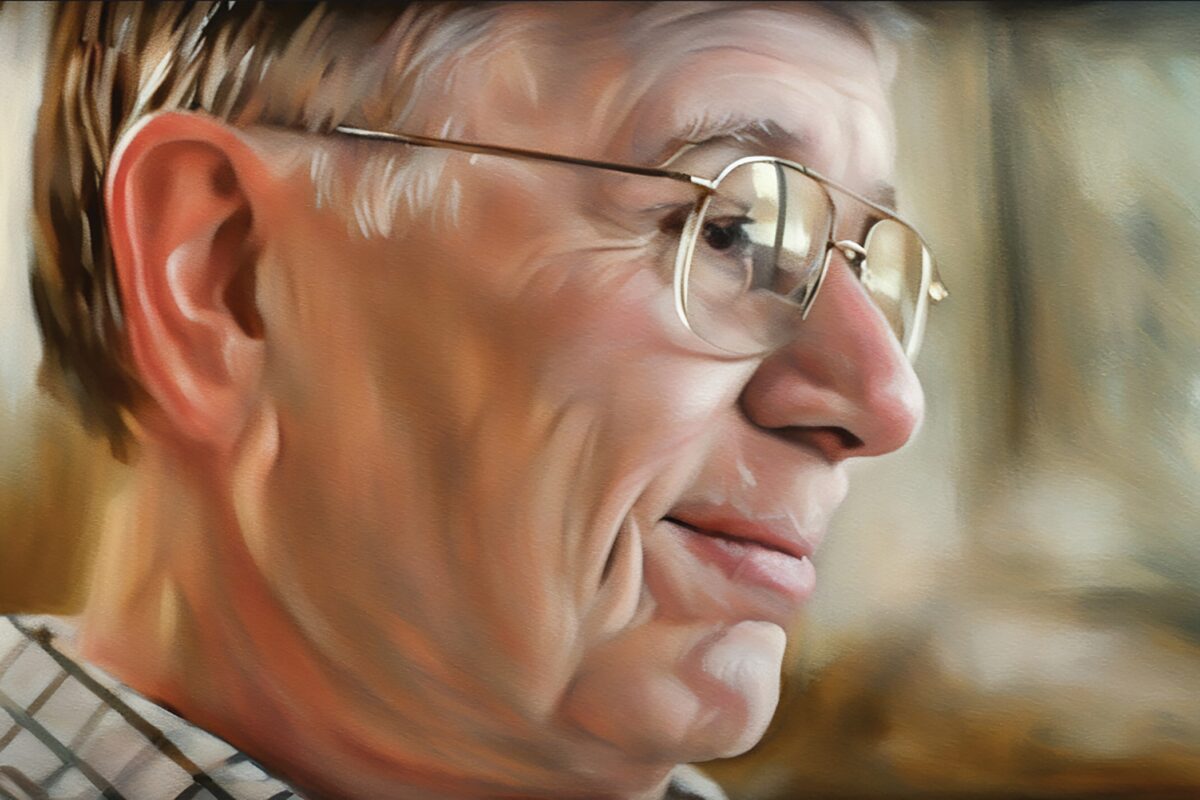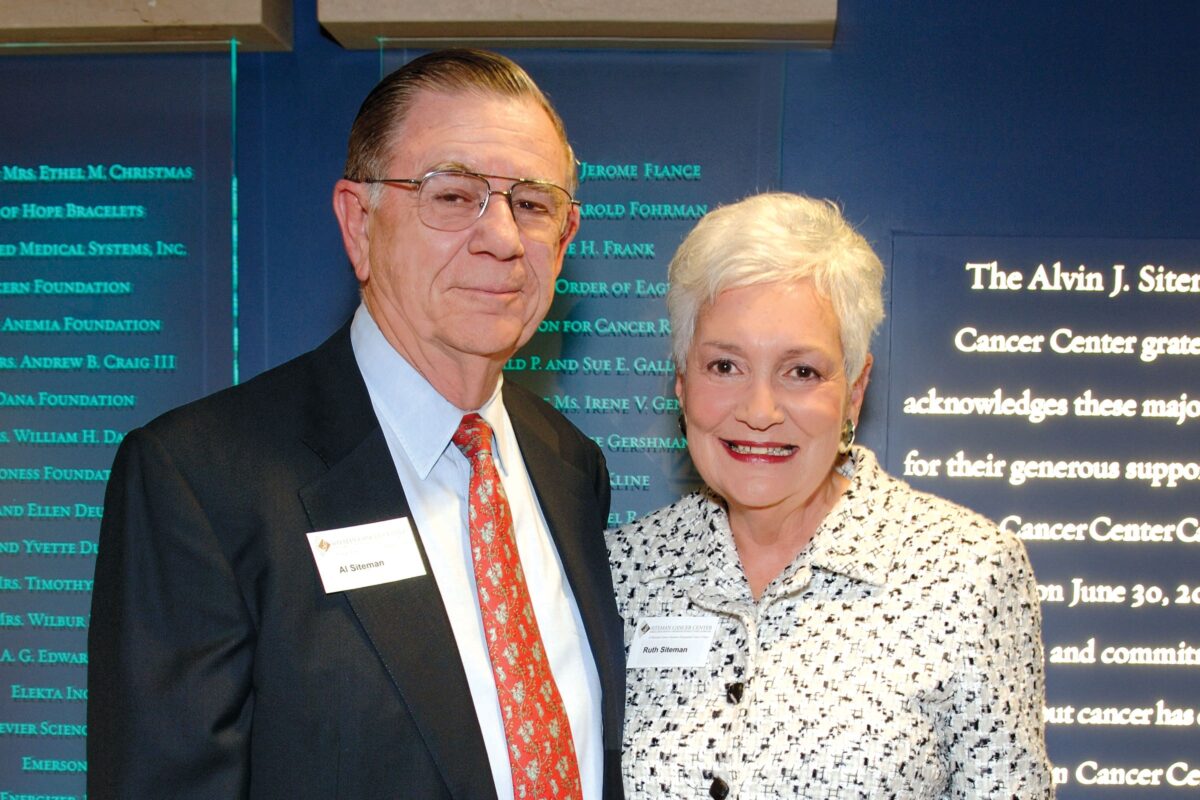
In 1999, Al Siteman posed a question that would advance human health worldwide and shape the future of St. Louis. Why, he asked, do patients in our region travel hundreds of miles to well-known cancer centers far from home to receive the highest quality cancer care?
Then he invested in the answer. Al and his wife, Ruth, who died in June, pledged $35 million to bring together cancer programs housed throughout WashU Medicine and create the Alvin J. Siteman Cancer Center. It was a monumental gift and the first of many that would help establish St. Louis as a destination for world-class cancer care.
Though the Sitemans preferred privacy, they agreed to give their name to the cancer center to catalyze fundraising. Within six months, other donors committed an additional $75 million to cover the initial costs of creating Siteman, based at Barnes-Jewish Hospital and WashU Medicine, and its numerous programs.
“That was a seminal moment,” said Timothy J. Eberlein, MD, director of Siteman Cancer Center and the Spencer T. and Ann W. Olin Distinguished Professor and senior associate dean for cancer programs at WashU Medicine. “The name instantly gave the center credibility.”
In the 25 years since the couple made that founding gift, the cancer center has become one of the elite centers leading the world in efforts to defeat cancer. And it is a relative newcomer — many peer institutions were established before 1950.
“Al’s commitment to bring equity to outcomes for cancer patients reflects his devotion to the St. Louis region and his depth of understanding of our work.”
—Graham A. Colditz, MD, DrPH
The center’s dramatic growth includes an increase in research funding since the center’s inception from $10 million to $70 million from the National Cancer Institute (NCI) to support innovative projects led by WashU Medicine scientists, and the expansion of its roster of WashU Medicine physicians and scientists to more than 600. And through Siteman’s seven locations, the center has treated more than 1 million patients.
Clinical trial participation has grown by 145%, from 3,921 participants in 1999 to 9,611 in 2023. The trials, led by WashU Medicine physicians, include those evaluating innovative investigational therapies for virtually every kind of cancer. This inspires hope among the patients who seek care at Siteman and is especially meaningful in economically disadvantaged communities, where myriad factors drive higher rates of cancer mortality.

Embracing the bold
Among the attributes that have characterized the Sitemans’ philanthropy over the years is their willingness to fund promising but untested hypotheses. In 2010, the couple endowed the Siteman Cancer Research Fund at WashU Medicine, which is part of a constellation of funds known collectively as the Siteman Investment Program. The competitive program provides seed grants to scientists with novel ideas, often early in their careers, to help them produce preliminary data needed to secure larger federal grants.
The program’s success is indisputable. From 2018 through 2022, the $31.1 million awarded through the program generated an additional $405 million in external funding from agencies such as the NCI. Grants have supported work to develop cancer vaccines, use light to safely kill cancer cells, and precisely target tumors with radiation, among other areas.
In addition, the couple’s generosity has spurred major scientific breakthroughs. In 2007, a team of WashU Medicine scientists led by Timothy J. Ley, MD, the Lewis T. and Rosalind B. Apple Professor of Medicine and a professor of genetics, were pursuing what had been described as a “bodacious experiment that could blow things wide open.” They aimed to be the first to sequence a patient’s cancer genome.
Join the Sitemans in furthering this legacy of hope and healing by giving to support cancer research.
Their project lacked both certainty — this was uncharted science — and resources. A federal agency had denied the scientists’ request for funding to get the project over the finish line. Then Al Siteman stepped in and committed $1 million. The gift powered completion of the study that fundamentally changed cancer care. The scientists developed a blueprint for discovering the unique genetic mutations that drive cancer growth in individual patients’ tumors, which ignited the meteoric rise of cancer genomics to guide treatment decisions.
“That gift is just one example of Al and Ruth’s vast impact,” said David H. Perlmutter, MD, executive vice chancellor for medical affairs, the George and Carol Bauer Dean of the School of Medicine and the Spencer T. and Ann W. Olin Distinguished Professor. “It is impossible to calculate the number of patients who experience better outcomes as a result of their willingness to take a risk on this research.”
Added Eberlein: “Al believed in a novel idea that led to fundamental advances in cancer care. This gift illustrates how philanthropy plays a key role in allowing us to carefully invest in new ideas — ideas that may become the treatments of tomorrow.”
Improving outcomes for St. Louis and beyond
Al Siteman’s giving priorities today sustain a passion he shared with his wife to improve access to top-notch cancer care for underserved populations. He continues to support the Siteman Program for the Elimination of Cancer Disparities, or PECaD, which strives to ensure that all cancer patients and communities in the cancer center’s 82-county catchment area in eastern Missouri and southern Illinois benefit from the scientific and clinical expertise of WashU Medicine faculty members.
“Al’s commitment to bring equity to outcomes for cancer patients reflects his devotion to the St. Louis region and his depth of understanding of our work,” said Graham A. Colditz, MD, DrPH, the Niess-Gain Professor of Surgery; director of the Public Health Sciences Division in the Department of Surgery; and associate director of prevention and control at Siteman. “He gives thoughtfully, strategically and with profound generosity.”
That profound generosity is shaped by his scientific curiosity, zeal for innovation, keen eye for risks worth taking, and unwavering trust in WashU Medicine physicians and scientists. Tucked quietly beneath those attributes is his compassion.
“When I see Al at the Medical Campus, invariably someone will stop him and say, ‘Hey, aren’t you Mr. Siteman?’” Eberlein said. “When he tells them he is, they thank him and say, ‘If not for you, my husband, son, aunt or other relative would not be alive.’ He gets tears in his eyes every time.”
Join the Sitemans in furthering this legacy of hope and healing by giving to support cancer research.
Published in the Autumn 2024 issue


